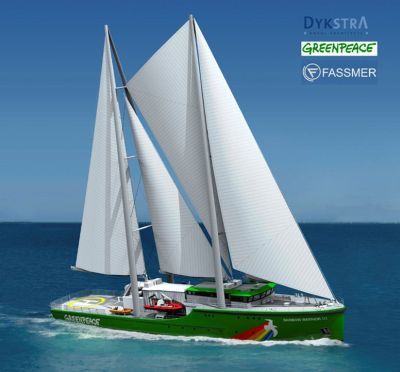
In a vast hanger in a north German Fassmer shipyard, environmental pressure group Greenpeace’s latest weapon is nearing completion: the state-of-the-art Rainbow Warrior III. “The Rainbow Warrior III is much more than a flagship,” the group’s spokesman
Mike Townsley told AFP ahead of the vessel being floated on Monday prior to its official launch for Greenpeace’s 40th birthday in October. “It is very modern and very ecological…. It is the practical application of our values.” Costing an estimated 23 million euros ($33.4 million), 10-15 percent of Greenpeace’s total annual budget, this is the first time that Greenpeace is having a Rainbow Warrior built from scratch to its own specifications.
The first one, sunk by French agents in 1985 in New Zealand while attempting to stop nuclear testing in the Pacific, was a converted British fisheries research trawler built in 1955 acquired by Greenpeace in 1978. The second, another former fishing vessel, is more than 50 years old and is being retired after being “rammed, raided and bombed” in numerous campaigns against nuclear testing, over-fishing and illegal logging, Greenpeace says.
Contract to construct what Greenpeace calls its “eyes and ears” against environmental destruction — and for action “when bearing witness isn’t enough” — went to 161-year-old German shipyard Fassmer in 2009. Hull was made in the Polish port of Gdansk, with work beginning last year on July 10, the same date as the sinking in Auckland 25 years earlier in which one activist died. It was brought to Germany in November.
Visited by AFP in recent days, the 58-metre-long (190-foot-long) vessel, weighing 680 tonnes, already sports the logo of a white dove and rainbow on each side of its green hull.
Inside, 120 employees of the family-owned Fassmer are working hard to get everything ready and to ensure that the shipyard meets Greenpeace’s demands that the vessel is ecologically sound.
“It is something very special working for Greenpeace,” says the ship’s chief designer Uwe Lampe, admitting to getting “a few migraines” trying to give the non-governmental organisation the ship of its dreams. “We have constructed a boat with an unusually high number of environmental and safety standards … We can only use parts that meet European norms and materials from Europe, so no Chinese steel or Russian plywood,” he said. “The whole concept of the boat was, how should I say, very complex. It’s like a small town, with its own electricity generator, air conditioning, waste water treatment and laboratory.”
The boat is powered by sails on its 50-metre masts, by an electric motor allowing it to reach a top speed of 10 knots and a diesel engine giving it 15 knots.
Another demand from Greenpeace was for Rainbow Warrior III’s radio room to be able to withstand for at least 30 minutes any attempts by special forces to break in — something which would not be a first.
The ship can house a crew of up to 33 who can survive for four weeks without outside supplies. It also has a helipad in the stern and its masts will be decked out with 48 antennae and other pieces of electronic gadgetry.
By Frederic Happe(mysinchew)
We use cookies to improve your experience. By continuing to use our site, you accept our Cookies, Privacy Policy,Terms and Conditions. Close X